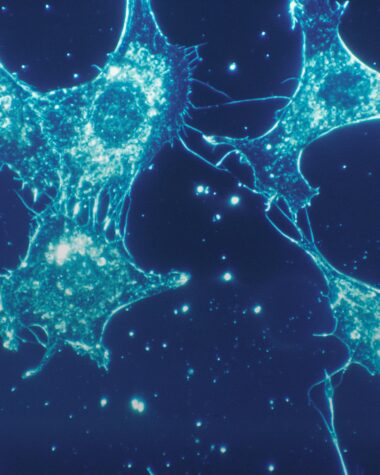FibroGen Inc. (NASDAQ:FGEN) is a biopharmaceutical company founded in 1993 and headquartered in San Francisco, California, with a focus on discovering, developing, and commercializing novel therapeutics to address serious unmet medical needs. Over the past three decades, the company has built a reputation as a leader in fibrosis and hypoxia-inducible factor (HIF) biology, leveraging its proprietary expertise to create first-in-class and best-in-class therapies in areas such as oncology, anemia, and fibrotic disease. From its inception, FibroGen has sought to harness cutting-edge science to advance treatments that can significantly improve the lives of patients, while also building strategic collaborations with global pharmaceutical leaders to help bring its discoveries to market.
The company’s most notable achievement has been the development of roxadustat, an oral small-molecule inhibitor of HIF prolyl hydroxylase, which stimulates the body’s natural pathways to promote red blood cell production and improve iron regulation. Roxadustat has been approved for the treatment of anemia associated with chronic kidney disease in multiple countries, including China, Japan, and Europe, where it is marketed through partnerships with AstraZeneca and Astellas. While the drug faced regulatory setbacks in the United States, it remains a significant part of FibroGen’s global strategy, particularly through the successful commercialization efforts in China that established the company as a commercial-stage biopharma player.
Beyond roxadustat, FibroGen has advanced an oncology pipeline centered on antibody-drug conjugates (ADCs) and imaging agents targeting novel pathways. One of its most promising candidates is FG-3246, a CD46-targeting ADC currently being studied for metastatic castration-resistant prostate cancer, alongside FG-3180, its companion PET imaging agent designed to help identify patients most likely to respond to therapy. This expansion into oncology marks an important evolution for the company, as it leverages decades of research to address high-value indications in cancer where there are limited effective treatment options.
FibroGen has also been active in partnerships and collaborations that support its pipeline development and commercialization. Its long-standing alliance with AstraZeneca has played a key role in developing and commercializing roxadustat in China, while its work with Astellas has extended its reach into Japan and Europe. These global relationships reflect FibroGen’s ability to generate value through strategic alliances, enabling it to pursue scientific innovation while sharing development risk. In addition, the company has sought to align its financial strategy with its clinical priorities, as demonstrated by its decision to divest its China operations to AstraZeneca in 2025 for approximately $160 million, a move designed to strengthen its balance sheet and extend its cash runway.
Over the years, FibroGen has faced setbacks, including the discontinuation of certain late-stage programs such as pamrevlumab in idiopathic pulmonary fibrosis and pancreatic cancer, but it continues to adapt by streamlining operations and focusing resources on its most promising areas. This resilience highlights its ability to reinvent itself while staying true to its mission of advancing transformative medicines. With its oncology pipeline moving into mid-stage trials and continued exploration of new indications for roxadustat, FibroGen remains committed to translating breakthrough science into therapies that can deliver long-term impact for patients worldwide.
Strategic Sale of FibroGen China Raises Red Flags
FibroGen’s announcement that it will sell its China operations to AstraZeneca for approximately $160 million appears on the surface to be a step toward financial stability, but the underlying message is far less encouraging. While management framed the move as a way to extend its cash runway into 2027 and simplify its capital structure, selling a key international subsidiary signals that FibroGen is retreating from one of its most valuable markets. Roxadustat, the company’s lead asset in China, was the category leader in anemia treatment for chronic kidney disease, yet FibroGen has effectively given up on its future growth potential in that region by transferring all rights to AstraZeneca. This underscores a shrinking strategic footprint and casts doubt on FibroGen’s long-term ability to generate meaningful revenue streams independently.

CHECK THIS OUT: Saudi Arabia Wants CEL-SCI (CVM)’s Multikine Now! and Aligos Therapeutics (ALGS) Doubles Cash to $122.9M.
Reliance on Asset Sales Rather Than Organic Growth
The $160 million transaction is split into an enterprise value of $85 million plus approximately $75 million in net cash held in China. The fact that FibroGen had to rely on this sale to stabilize its balance sheet highlights how limited its revenue generation has become. In its latest financial updates, FibroGen reported preliminary unaudited cash, equivalents, and receivables of just $121.1 million as of December 31, 2024, which is insufficient to fund ambitious drug development programs. Selling an international arm to plug financial gaps demonstrates a company that is financing operations by divesting assets rather than building durable income from product sales.
Weakening Pipeline Leaves Few Catalysts
FibroGen insists that it will focus resources on its oncology pipeline, specifically FG-3246, a CD46-targeting antibody drug conjugate for metastatic castration-resistant prostate cancer, and its companion PET imaging agent, FG-3180. A Phase 2 monotherapy trial is expected to begin in 2Q 2025, but this program is still early in development. With no near-term commercialization prospects and a long, uncertain regulatory path ahead, FG-3246 cannot offset the loss of China’s revenue-generating roxadustat rights anytime soon. Given FibroGen’s history of late-stage trial failures, most notably with pamrevlumab in multiple indications, investor skepticism is warranted about the true potential of these early-stage oncology assets.
Regulatory Uncertainty for Roxadustat in the U.S.
FibroGen continues to maintain its rights to roxadustat in the U.S. and other non-Astellas territories, but the drug’s regulatory journey has been rocky. The FDA previously rejected roxadustat for anemia in chronic kidney disease due to safety concerns, and while FibroGen is now pursuing anemia in lower-risk myelodysplastic syndrome (LR-MDS), success is far from guaranteed. The company is preparing for an FDA meeting in the second quarter of 2025, but investors must be realistic: the hurdles in gaining U.S. approval remain steep. Without a breakthrough here, FibroGen’s future revenue base is further jeopardized.
Capital Structure Simplification Masks Deeper Issues
While repaying its term loan from Morgan Stanley Tactical Value is a positive in terms of reducing leverage, this “simplification” only came about because of the China sale. It suggests FibroGen lacked sufficient organic cash flow to meet its obligations and had to restructure its capital position by shrinking operations. Extending the cash runway into 2027 offers breathing room, but it does not solve the fundamental issue: FibroGen still has no dependable commercial product pipeline in its core markets, leaving its survival tied to uncertain clinical trials.
Market Confidence Continues to Erode
Investors have grown increasingly cautious about FibroGen’s prospects, especially after multiple clinical failures and mass workforce reductions in prior years. The divestiture of its China arm only reinforces the perception that FibroGen is in retreat, cutting back its global reach rather than expanding it. Analysts may question whether the company is merely buying time rather than building a sustainable growth model. The combination of asset sales, limited revenue, and reliance on a thin pipeline heightens the risk of shareholder dilution if new funding is required before 2027.
Conclusion: Short-Term Lifeline, Long-Term Doubts
FibroGen’s sale of its China subsidiary to AstraZeneca may provide a temporary boost to the balance sheet, but it comes at the cost of surrendering rights to one of its only revenue-generating assets. While management emphasizes the chance to advance FG-3246 and other oncology candidates, the company’s history of clinical disappointments and ongoing regulatory uncertainty around roxadustat cast significant doubt on its future. Extending the cash runway into 2027 buys time, but unless FibroGen delivers unexpected clinical wins, its long-term growth story remains weak. For bearish investors, this transaction highlights the company’s reliance on short-term fixes rather than long-term value creation, keeping FibroGen squarely in the high-risk category.
READ ALSO: Exact Sciences (EXAS) Just Made Cancer Detection 100x Easier! and Soleno Therapeutics (SLNO): The Biotech Company That Could Make You Rich.








